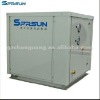Ground to water heat pump
Geothermal heat pumps (GHPs) are a relatively new technology that can save homeowners money. These ground-source heat pumps use the natural heat storage capacity of the earth or ground water to provide energy efficient heating and cooling. GHPs should not be confused with air-source heat pumps that rely on heated air.
Geothermal heat pumps use the relatively constant temperature of the ground or water several feet below the earth's surface as source of heating and cooling. Geothermal heat pumps are appropriate for retrofit or new homes, where both heating and cooling are desired. In addition to heating and cooling, geothermal heat pumps can provide domestic hot water. They can be used for virtually any size home or lot in any region of the U.S.
A geothermal heat pump system consists of indoor heat pump equipment, a ground loop, and a flow center to connect the indoor and outdoor equipment. The heat pump equipment works like a reversible refrigerator by removing heat from one location and depositing it in another location. The ground loop, which is invisible after installation, allows the exchange of heat between the earth and the heat pump.
Geothermal heat pumps can be open- or closed-loop. Open-loop systems draw well water for use as the heat source or heat sink, and after use, return the well water to a drainage field or another well. Closed-loop or earth-coupled systems use a water and antifreeze solution, circulated in a ground loop of pipe to extract heat from the earth.
Ground loops can be installed in a vertical well or a horizontal loop. Vertical wells are usually more expensive and used where space is limited. The length of loop pipe required will vary with soil type, loop configuration, and system capacity. Loop length can range from 250 to 1,000 feet per ton of capacity.
Special heat pump features can include variable speed blowers and multiple-speed compressors. These features can improve comfort and efficiency in areas where heating and cooling loads are quite different. Add-on features include the capability to produce hot water.
Desuperheaters can be added to supplement the production of domestic hot water when there is a demand for space heating or cooling. These devices make use of excess heat during the cooling cycle and use some of the heat during the heating cycle to supplement hot water production. Dedicated water heaters can be added which operate whenever there is a demand for hot water.
Geothermal heating can be more efficient than electric resistance heating. These systems are also typically more efficient than gas or oil-fired heating systems. They are more energy efficient than air-source heat pumps because they draw heat from, or release heat to, the earth, which has moderate temperatures year round, rather than to the air (which is generally colder in winter and warmer in summer than the earth, resulting in less effective heat transfer).
PATH Attributes
Geothermal heat pumps have demonstrated energy savings over air heat pumps because they extract energy from the constant temperature of the earth (via a water pipe buried in the earth) to condition the air in a home. In a sense, geothermal is a partially-renewable form of energy.
Ease of Implementation
Geothermal heating and cooling equipment is readily available in the marketplace and can be installed by any qualified HVAC contractor. The process is two-fold in that it involves installing the indoor unit and method of delivery, whether forced hot air or hydronic, and the outside pipe loop. Loop installation can be planned concurrently with other construction activities, so the overall construction schedule should not be affected by choice of system. Some loops will require an additional permit. Geothermal equipment can be installed with equal ease in both new construction and remodeling projects.
Initial Cost
The initial cost of a geothermal heat pump system varies greatly according to local labor rates, lot geology and size, type of system installed, and equipment selected. So, GHP systems are more costly to install than air source heat pumps. For either system, the cost of installed ducts should be identical. Equipment costs can be 50-100% more expensive for a geothermal heat pump system when the circulating pump, indoor tubing, and water source heat pump are considered. This 50-100% premium translates to $1,000 - $2,000 for the equipment that supplies a 3-ton system.
The ground loop is generally the most expensive component of a geothermal heat pump system and is highly dependent on local labor rates and drilling conditions. An installed ground loop stubbed out in a home can cost between $1,000 and $3,000 per installed ton. Overall, one could expect to pay between $4,000 and $11,000 more for a 3-ton GHP system than for an air source heat pump system.












